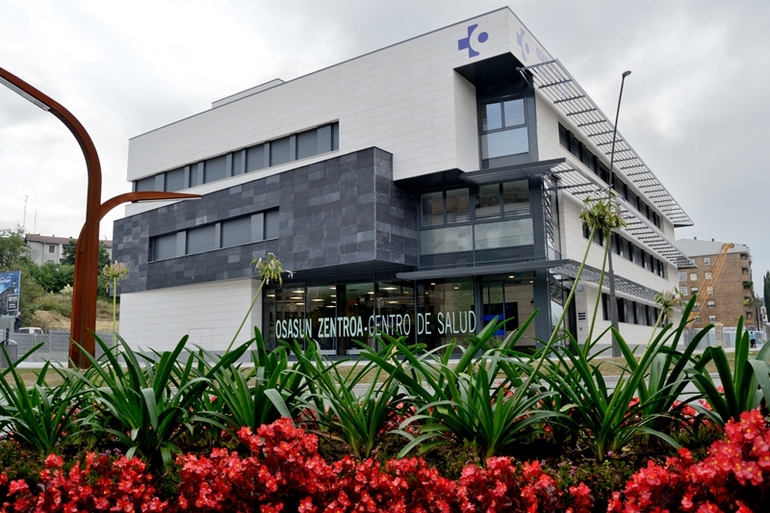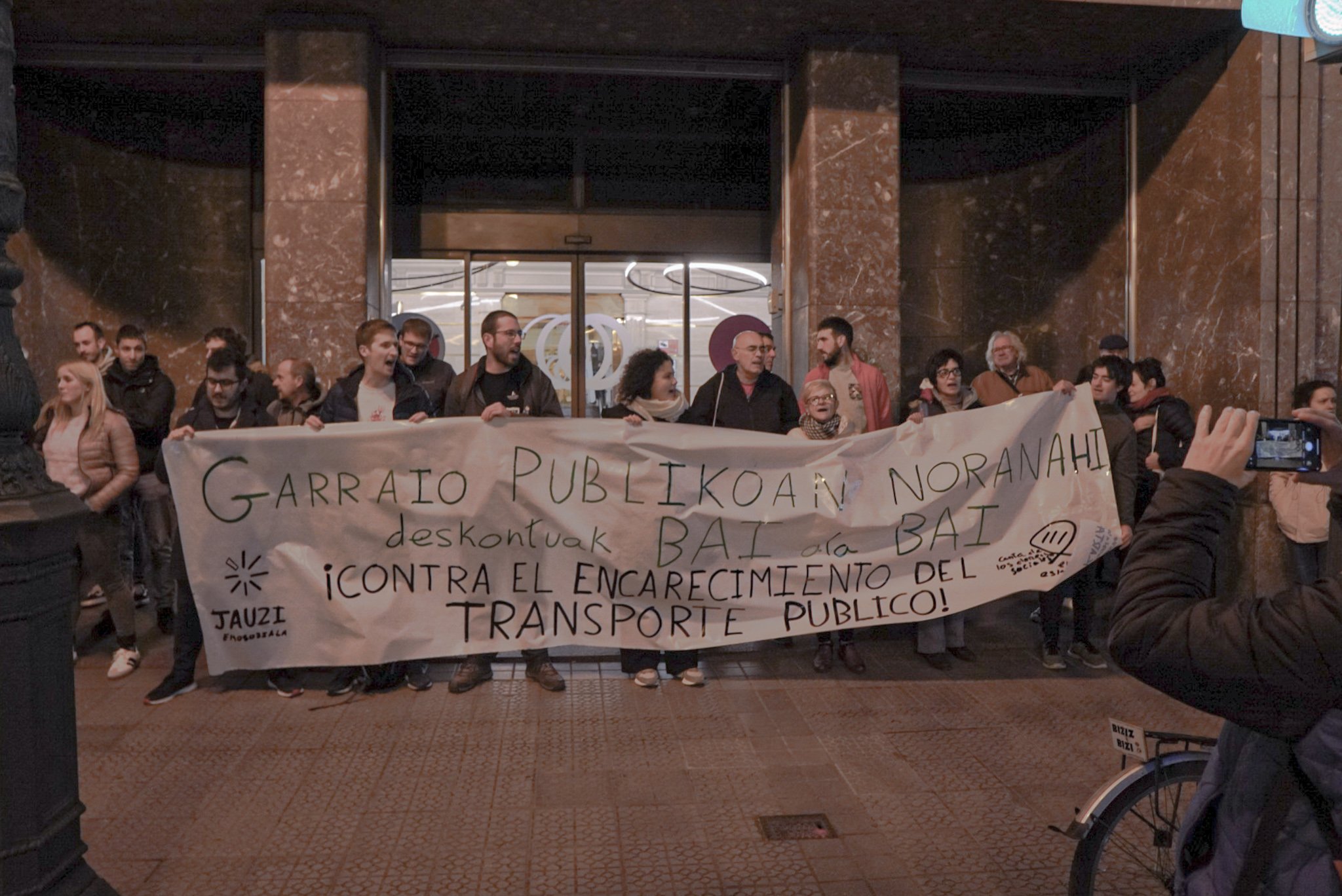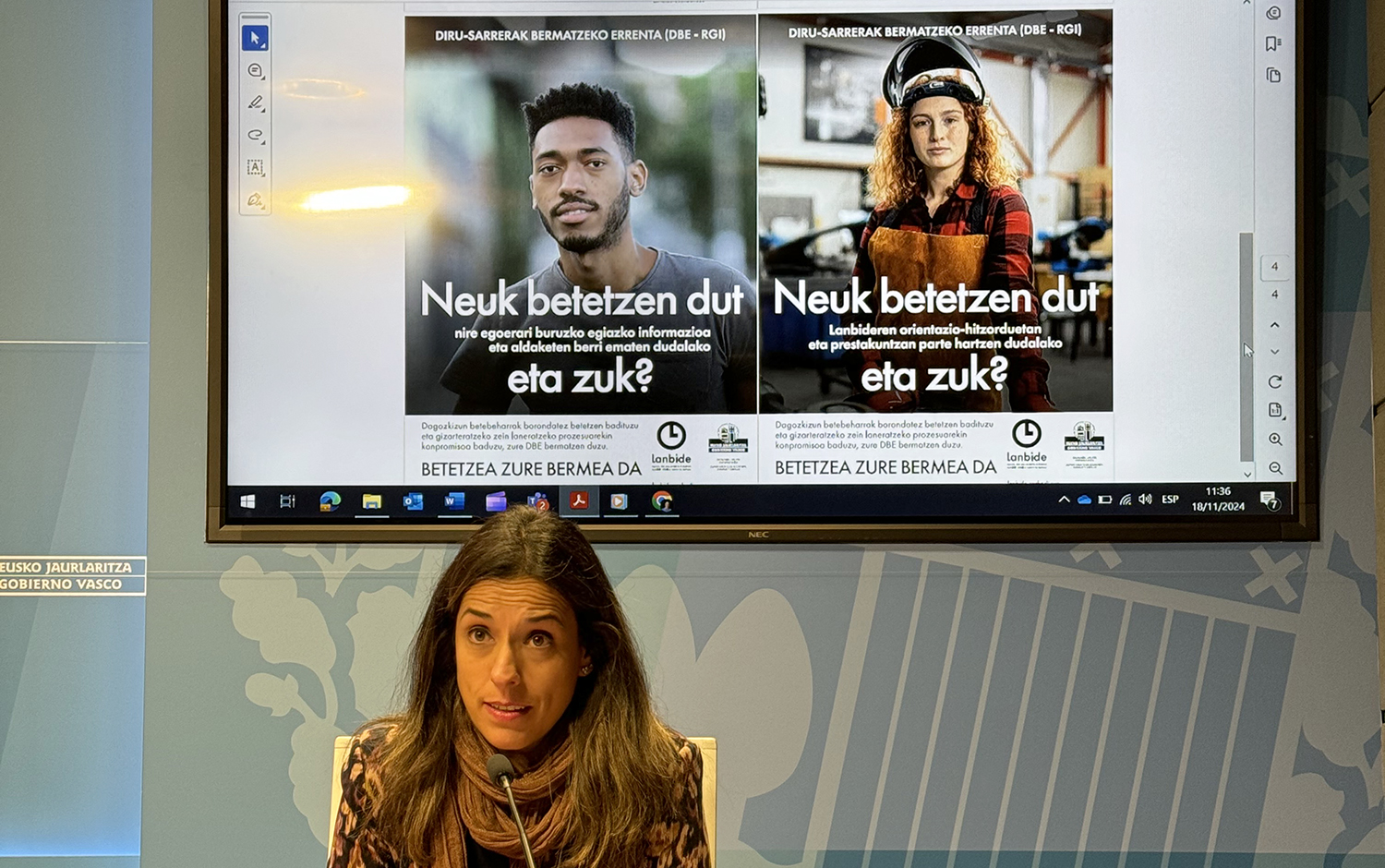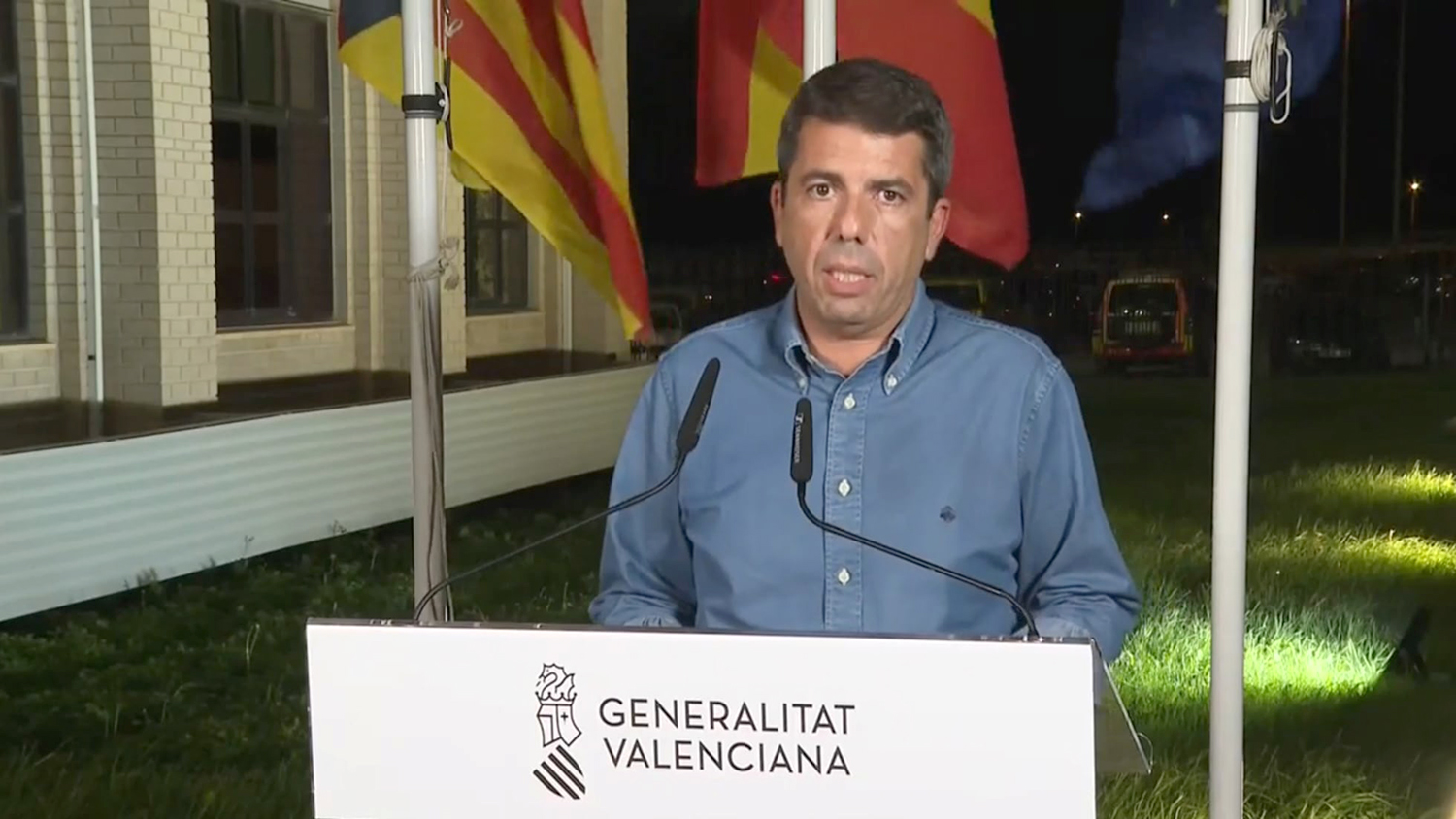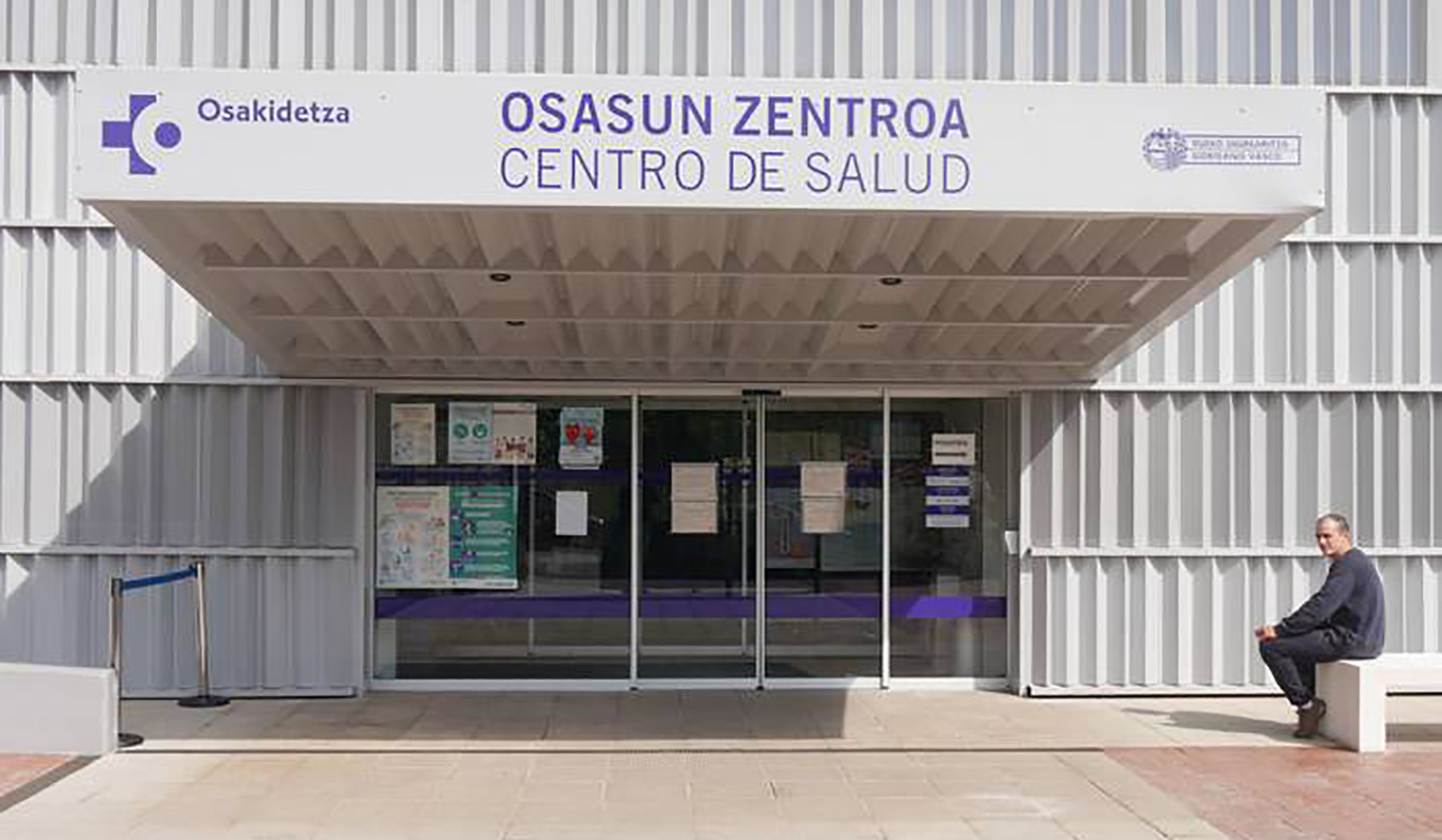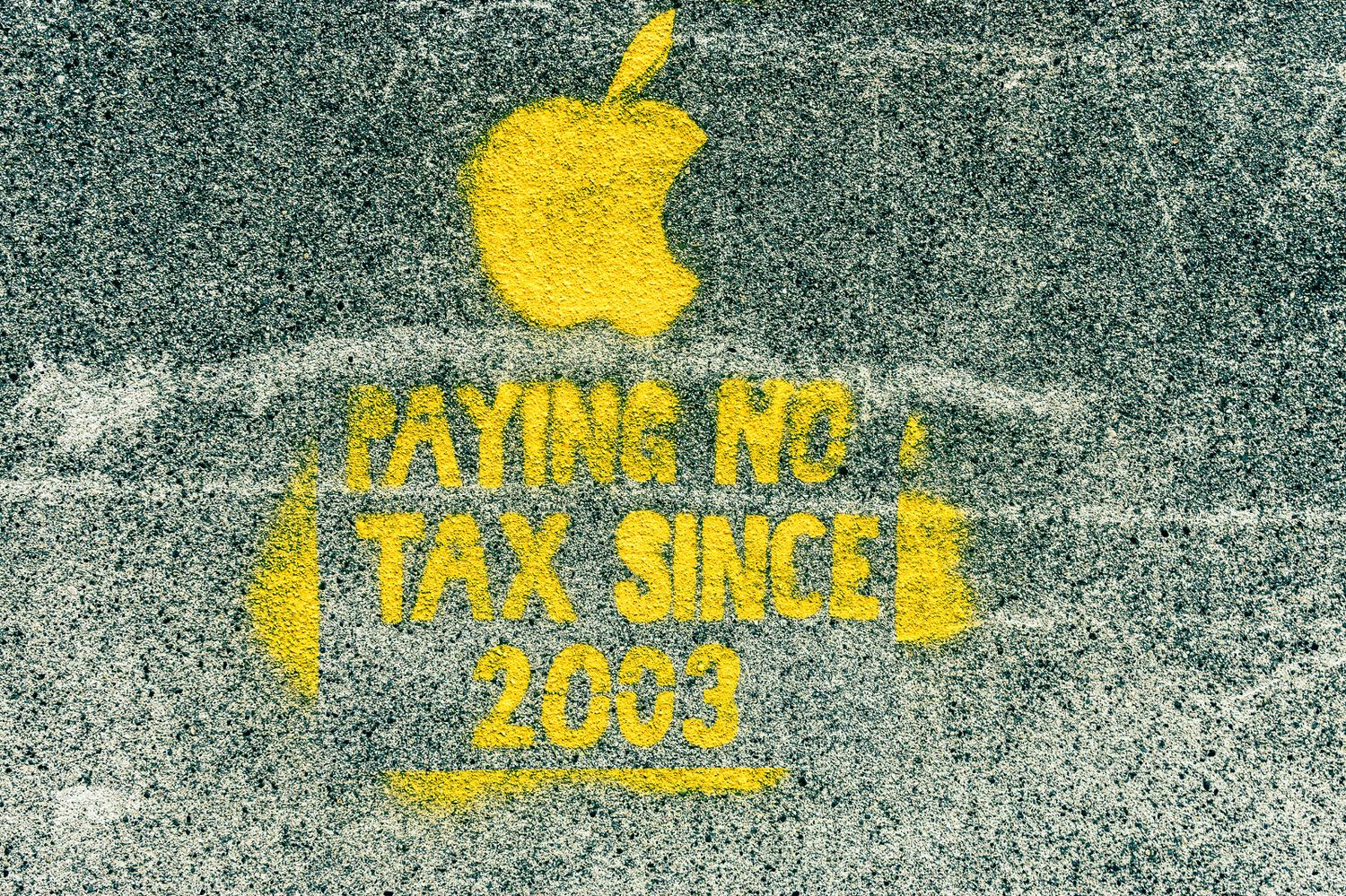Society
Environment
Politics
Economy
Culture
Basque language
Feminism
Education
International
Opinion
sunday 09 march 2025
Automatically translated from Basque, translation may contain errors. More information here. 
Prepared for the (dark) future
- They are more prepared than ever, and in return the labour market offers them unemployment or precarious conditions. The Director of the International Monetary Fund, Dominique Strauss-Kahn, recently named them the “lost generation.” They are under 35 years old and we want to know how they see the future.
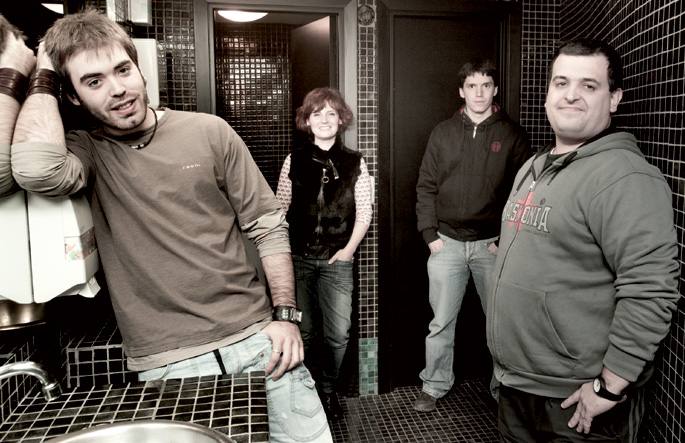
Aitor Zabaleta, Amagoia Ruiz, Unai San Sebastian eta Unai Kerejeta.Dani Blanco
Zarata mediatikoz beteriko garai nahasiotan, merkatu logiketatik urrun eta irakurleengandik gertu dagoen kazetaritza beharrezkoa dela uste baduzu, ARGIA bultzatzera animatu nahi zaitugu. Geroz eta gehiago gara, jarrai dezagun txikitik eragiten.
He had been working in the same company for six years and decided to apply for a non-paid seniority. They gave it to him... and fifteen days later he was thrown out. I recently heard a woman on the bus. In short, Zabaleta says that unfair dismissal is cheap for companies and that the aim of big companies, banks and authorities is to make as much money as possible, maintaining the philosophy behind the crisis: “All the actions that are being carried out in the face of the crisis seek not to change the structure, to support the assembly that we know, but that is a mistake, because although in recent years it has given us false growth because there is a structural problem behind it, this system does not work and we have to look for alternatives.” This system has led to
a decline in working conditions, has led to restrictions to the condition of the welfare state and has generalized precariousness. Yes, the risk of becoming vital precarious is close to being perpetuated by today’s young people, because we have moved from “funicular” to “carousel” lives, as sociology professor Gorka Moreno said in the opinion section of Luz (number 2.251): “Many who started out as first pawns were getting higher salaries and better jobs over time, and thereby securing decent retirement pensions.” Past lives were always on the rise. Now, however, the certainty of income and the guarantee of a fixed position has been lost, even for the most experienced, because they cost the system dearly, says sociologist Xabier Aimedio. In his opinion, it is the beginning of a new era, because the productive process has already begun to generate surpluses, there is no need for so many workers, and in addition, the more efficient production according to the logic of the system, the more unemployment will be generated. “There aren’t enough people to buy enough cars, so the solution can’t be to make more cars! It is said that consumption needs to be stimulated, and at the same time people are thrown out of the companies. The current system is unfair and there does not seem to be a chance to turn it
around.” The four young people we have invited to talk about it also see the future as bleak. Unai San Sebastián and Unai Kerejeta hope that the crisis will pass, but they perceive that this time it is a different crisis, that the evil situation will last for a long time. For Amagoia Ruiz, the companies have taken advantage of it to establish more precarious working conditions, with a sharp fall in wages, and once the job starts to emerge again, it will not be possible to recover the old characteristics so easily: “I would say that they will take advantage of it for many years to see if we do not fall into another crisis on that
path...” The first slap is received with the trainee practices. Zabaleta would like to work in the area of communication, but she finds it difficult because of the strong competition, which is dominated by precariousness: “I worked at Radio Euskadi during the summer and I saw people who were very valuable, but at the end of the internship they were thrown out on the streets because it is not economically convenient for them to make the contract. Take another for the same position again, with less knowledge and experience, and move on. They don’t care if they give less quality if it comes out
cheaper.” San Sebastián and Kerejeta work in two modules with the aim of doing internships in companies in the Goierri area and staying there if it goes well. In their field, they say that companies do not play games to take advantage of the scholarship holders, and they have not lost hope that there will be work. “The question is under what conditions,” Zabaleta adds. In Gipuzkoa unemployment may not be as high, but taking advantage of the crisis the conditions have fallen a lot, people are willing to accept anything for getting a job, because they are mortgaged and suffocated.” Kerejeta says that in the first metalworking industry they went from Bizkaia to Gipuzkoa looking for workers and that people chose the job according to conditions and salary, “but that’s over, now the situation is the other way around”. And in addition, companies have prepared people at their
doorstep. Moreover, they are often overqualified and overqualified for the jobs they obtain. Zabaleta says that her father works in a company and this is the daily bread: because of their very good CVs, all the young people who enter now are offered much lower salaries, in very precarious conditions, “and everyone says yes”. The same conjecture has noticed the generational change in the university: “It is not possible that the one who does a job like me, for having been born 25 years after me, wins my sixth; and in college it is so: the substitutes charge a maximum of 500-600 euros. In companies, the conditions are even worse, and this cannot be tolerated, it should embarrass us, encourage us to think.” In these
conditions, it is very difficult for young people to leave their parents' home. Kerejeta lives with his girlfriend, and since the couple is working, the mortgage is portable for now, but the Urretxu ends his unemployment in March “and then there will be comedies”, he has no choice but to find a job after the practices so that the mortgage doesn’t suffocate them. San Sebastián, as things are now, finds it impossible to enter only into a flat, and Zabaleta is clear that buying it is not at hand, even after finishing his career this year and getting a job in his field: “I will probably have to go with a group of friends to rent and still gravely, because the rent itself is suicide right now! Otherwise, I’ll have to act like a lot of my friends: in a job during the week, and in a bar-or at the weekend, I mean, like a servant.”
Zabaleta had a discussion with a friend who decided to clear up his doubts: he asked his father for the payroll of 30 years ago and the price of the house he had bought at that time; he then compared it with his current father’s payroll and the price of the house and found that the proportion has increased enormously – imagine if the exercise is done with the salary of the young rookie. Zabaleta is in favour of social renting, but staying at her parents’ house is the only option for many. “I’ve seen more than one case in the area: buying a house, then not being able to maintain it, renting it and going back to my parents.”
To face the panorama, the four young interlocutors have chosen the studies: the vocational training module after unemployment Kerejeta and San Sebastián, combined with the work of the bar Communication studies Zabaleta, and the thesis of Fine Arts Ruiz: “In the next decade there will be many university professors retiring and my goal is to get that job, but who knows when, maybe within ten years... What to do in the meantime? Keep learning and working on everything with patience. At the bar, I’ve been teaching classes, cashiers..., often without contracts and with bad conditions, but as long as I don’t forget the final goal, I don’t care if the road is hard.” They have complained that the studies are generally very theoretical, but it is better to prepare
than to be left without work and without homework. The other alternatives? San Sebastián is clear that starting your own business is risky, “big companies are bad and we would have a hard time competing too.” In the words of Kerejeta, “we will all have to end up traveling abroad, to Germany or Switzerland, as in the past.” But Zabaleta does not like this idea: “I’ve heard a lot of people come out and I’ve thought about it, but I’m Basque and I want to do my future there if possible. It would be a shame if the only alternative was to go outside. This is where we must seek solutions, build a fairer society, and for this society must be the owner of its economy. This crisis has given us the opportunity to do so, for example when all the banks have fallen one after the other, they could have opted for nationalisation.”
At a time when the debate on degrowth is in full swing, I have asked my interlocutors if the crisis could be an opportunity to change mentality, if it is time to take the path towards austerity in relation to the prosperity of recent years. Kerejeta says that after being so well acquainted, it is not easy to adapt to the new situation, but in his case it will not cost him because his previous salary was not very good. For San Sebastián, to live well would be to meet with friends, to have a regular dinner at the local community and to be able to go to work on Mondays, he doesn’t think that it takes much more to lead a decent life, and Ruiz would be content to have only one job, Monday to Friday, and if it’s a job he’ll be happy to do, it’s a lot of hours in the workplace. “The salary doesn’t have to be high, but enough to live well, and it’s not good to have money to go on vacation, for example, our parents didn’t go on vacation and we are going more and more, not only in the summer, but now also on any holidays and bridges.” Is it good to travel, to have two cars or to
have brand clothes? Some people believe that we have brought happiness to material things. “You are sad and you are going to go shopping, to buy some greed, clothes... but we must direct our happiness and free time to another direction, to a life that is not linked to consumerism. They have taught us that we have to live by consuming, because some are interested in it, to enrich themselves, they have also sold it to us on television, and we have fallen into this vicious circle.” They also insist that the appearance is great, that you can’t be “less than others”, that you can’t work
on anything or spend less money than others. San Sebastián and Kerejeta have 18-19 year old classmates in the modules, and it is said that they have not yet suffered economic hardship, that they live quietly, without too much concern for the future. “After all, what model do they receive from us? “They’ve seen that we’ve been learning and studying to be out of work or to work in very bad working conditions, so...” “Young people are not dumb – Zabaleta – and if you give them everything done, they’ll take it, they’ll fit in comfortably, I would do the same. The problem is in the values, because they have taught us that we have everything we want from an early age. Working before was positive and now it’s stupid: you have to make as much money as possible by working as little as possible. Turn on the TV and what are the models? Belen Esteban, Big Brother...”. But then
comes the frustration that these models are not real and that the imperative has not been fulfilled either: young people have been told that they would receive compensation if they did the Master’s, if they were willing to move through learning languages, being flexible... But then they have been told that they do not have a job. Sociologist Xabier Aimedio warns that if the efforts made are not compensated, the frustration of the people can lead to dangerous results: the creation of Nazism in middle classes, attitudes against immigrants and the poor... The interlocutors say that in hospitality, fishing or construction you see a lot of immigrants, but that they are jobs that the natives did not want to take in the past and so it is not up to us to complain now, because they are equal rights for all. However, they should work under local conditions, because trading for less is to their detriment and to everyone. In the words of Amagoia Ruiz, she has heard from numerous cleaning houses that people from outside are willing to work for very little and can not compete with it.
The fact is that more and more people here accept the deplorable conditions offered. The competition is great and Zabaleta says that it is already perceived in the university, in an intense race to be the best. Kerejeta has a better environment in vocational training, and San Sebastián points out that competitiveness or solidarity depends on oneself: Even when he studied engineering, some were more competitive, others helped each other, and it was up to each one to decide what choice to make.
Protests are on the rise in many countries. Also here in Bayonne last October there was the largest demonstration of all time (19,000 people) against the reform of the retorts. On the other hand, in the Southern Basque Country, hardly any movement has been observed. They say that people still have money, will the protests come when unemployment benefits – taking into account that the Spanish government has withdrawn the subsequent subsidy – are stopped, when the unaffordable housing is generalized...? Maybe we’ll have to get to the extreme, something scandalous will have to happen, to move people, says Kerejeta. They have gone out into the streets in England, France, Italy... and Zabaleta criticizes the fact that we swallow everything in our country: she can understand it among older people for what they may have to lose, but she finds it sad to see young people standing still instead of fighting to guarantee their future. “They educate us for passivity, and the reaction is that, ‘what’s there and that’s it’. We should love ourselves more if we don’t want to be subordinate and servant for life.” However, we do not have
a map, we lack an accurate diagnosis of the situation and the culprits, according to Conjecti, and we do not mobilize because we do not know who the enemy is. He says that the aggression that comes from the economy is mixed with politics, instead of the bankers being the culprits, the damage is the bad decisions of the governments, and there is a risk of resorting to populist and anti-democratic positions. We rejoice when they lower the salaries of the officials, we blame the Chinese... “But to think of each other in their own place is not the solution, it is necessary to think, decide and act on
the global”. In negative situations, however, one cannot lose hope. Whatever his job, Ruiz doesn’t want to forget his final goal and will continue to prepare him to be a teacher. San Sebastián and Kerejeta hope that the module and subsequent practices will bear fruit, and Zabaleta will not be frustrated by the crisis: “You have to accept reality, know what it’s like and be realistic, but don’t settle. With pessimism, nothing is achieved and we must move forward. If you don’t like reality, try to change it.”
a decline in working conditions, has led to restrictions to the condition of the welfare state and has generalized precariousness. Yes, the risk of becoming vital precarious is close to being perpetuated by today’s young people, because we have moved from “funicular” to “carousel” lives, as sociology professor Gorka Moreno said in the opinion section of Luz (number 2.251): “Many who started out as first pawns were getting higher salaries and better jobs over time, and thereby securing decent retirement pensions.” Past lives were always on the rise. Now, however, the certainty of income and the guarantee of a fixed position has been lost, even for the most experienced, because they cost the system dearly, says sociologist Xabier Aimedio. In his opinion, it is the beginning of a new era, because the productive process has already begun to generate surpluses, there is no need for so many workers, and in addition, the more efficient production according to the logic of the system, the more unemployment will be generated. “There aren’t enough people to buy enough cars, so the solution can’t be to make more cars! It is said that consumption needs to be stimulated, and at the same time people are thrown out of the companies. The current system is unfair and there does not seem to be a chance to turn it
around.” The four young people we have invited to talk about it also see the future as bleak. Unai San Sebastián and Unai Kerejeta hope that the crisis will pass, but they perceive that this time it is a different crisis, that the evil situation will last for a long time. For Amagoia Ruiz, the companies have taken advantage of it to establish more precarious working conditions, with a sharp fall in wages, and once the job starts to emerge again, it will not be possible to recover the old characteristics so easily: “I would say that they will take advantage of it for many years to see if we do not fall into another crisis on that
path...” The first slap is received with the trainee practices. Zabaleta would like to work in the area of communication, but she finds it difficult because of the strong competition, which is dominated by precariousness: “I worked at Radio Euskadi during the summer and I saw people who were very valuable, but at the end of the internship they were thrown out on the streets because it is not economically convenient for them to make the contract. Take another for the same position again, with less knowledge and experience, and move on. They don’t care if they give less quality if it comes out
cheaper.” San Sebastián and Kerejeta work in two modules with the aim of doing internships in companies in the Goierri area and staying there if it goes well. In their field, they say that companies do not play games to take advantage of the scholarship holders, and they have not lost hope that there will be work. “The question is under what conditions,” Zabaleta adds. In Gipuzkoa unemployment may not be as high, but taking advantage of the crisis the conditions have fallen a lot, people are willing to accept anything for getting a job, because they are mortgaged and suffocated.” Kerejeta says that in the first metalworking industry they went from Bizkaia to Gipuzkoa looking for workers and that people chose the job according to conditions and salary, “but that’s over, now the situation is the other way around”. And in addition, companies have prepared people at their
doorstep. Moreover, they are often overqualified and overqualified for the jobs they obtain. Zabaleta says that her father works in a company and this is the daily bread: because of their very good CVs, all the young people who enter now are offered much lower salaries, in very precarious conditions, “and everyone says yes”. The same conjecture has noticed the generational change in the university: “It is not possible that the one who does a job like me, for having been born 25 years after me, wins my sixth; and in college it is so: the substitutes charge a maximum of 500-600 euros. In companies, the conditions are even worse, and this cannot be tolerated, it should embarrass us, encourage us to think.” In these
conditions, it is very difficult for young people to leave their parents' home. Kerejeta lives with his girlfriend, and since the couple is working, the mortgage is portable for now, but the Urretxu ends his unemployment in March “and then there will be comedies”, he has no choice but to find a job after the practices so that the mortgage doesn’t suffocate them. San Sebastián, as things are now, finds it impossible to enter only into a flat, and Zabaleta is clear that buying it is not at hand, even after finishing his career this year and getting a job in his field: “I will probably have to go with a group of friends to rent and still gravely, because the rent itself is suicide right now! Otherwise, I’ll have to act like a lot of my friends: in a job during the week, and in a bar-or at the weekend, I mean, like a servant.”
Zabaleta had a discussion with a friend who decided to clear up his doubts: he asked his father for the payroll of 30 years ago and the price of the house he had bought at that time; he then compared it with his current father’s payroll and the price of the house and found that the proportion has increased enormously – imagine if the exercise is done with the salary of the young rookie. Zabaleta is in favour of social renting, but staying at her parents’ house is the only option for many. “I’ve seen more than one case in the area: buying a house, then not being able to maintain it, renting it and going back to my parents.”
Looking for an alternative
To face the panorama, the four young interlocutors have chosen the studies: the vocational training module after unemployment Kerejeta and San Sebastián, combined with the work of the bar Communication studies Zabaleta, and the thesis of Fine Arts Ruiz: “In the next decade there will be many university professors retiring and my goal is to get that job, but who knows when, maybe within ten years... What to do in the meantime? Keep learning and working on everything with patience. At the bar, I’ve been teaching classes, cashiers..., often without contracts and with bad conditions, but as long as I don’t forget the final goal, I don’t care if the road is hard.” They have complained that the studies are generally very theoretical, but it is better to prepare
than to be left without work and without homework. The other alternatives? San Sebastián is clear that starting your own business is risky, “big companies are bad and we would have a hard time competing too.” In the words of Kerejeta, “we will all have to end up traveling abroad, to Germany or Switzerland, as in the past.” But Zabaleta does not like this idea: “I’ve heard a lot of people come out and I’ve thought about it, but I’m Basque and I want to do my future there if possible. It would be a shame if the only alternative was to go outside. This is where we must seek solutions, build a fairer society, and for this society must be the owner of its economy. This crisis has given us the opportunity to do so, for example when all the banks have fallen one after the other, they could have opted for nationalisation.”
A change of mentality
At a time when the debate on degrowth is in full swing, I have asked my interlocutors if the crisis could be an opportunity to change mentality, if it is time to take the path towards austerity in relation to the prosperity of recent years. Kerejeta says that after being so well acquainted, it is not easy to adapt to the new situation, but in his case it will not cost him because his previous salary was not very good. For San Sebastián, to live well would be to meet with friends, to have a regular dinner at the local community and to be able to go to work on Mondays, he doesn’t think that it takes much more to lead a decent life, and Ruiz would be content to have only one job, Monday to Friday, and if it’s a job he’ll be happy to do, it’s a lot of hours in the workplace. “The salary doesn’t have to be high, but enough to live well, and it’s not good to have money to go on vacation, for example, our parents didn’t go on vacation and we are going more and more, not only in the summer, but now also on any holidays and bridges.” Is it good to travel, to have two cars or to
have brand clothes? Some people believe that we have brought happiness to material things. “You are sad and you are going to go shopping, to buy some greed, clothes... but we must direct our happiness and free time to another direction, to a life that is not linked to consumerism. They have taught us that we have to live by consuming, because some are interested in it, to enrich themselves, they have also sold it to us on television, and we have fallen into this vicious circle.” They also insist that the appearance is great, that you can’t be “less than others”, that you can’t work
on anything or spend less money than others. San Sebastián and Kerejeta have 18-19 year old classmates in the modules, and it is said that they have not yet suffered economic hardship, that they live quietly, without too much concern for the future. “After all, what model do they receive from us? “They’ve seen that we’ve been learning and studying to be out of work or to work in very bad working conditions, so...” “Young people are not dumb – Zabaleta – and if you give them everything done, they’ll take it, they’ll fit in comfortably, I would do the same. The problem is in the values, because they have taught us that we have everything we want from an early age. Working before was positive and now it’s stupid: you have to make as much money as possible by working as little as possible. Turn on the TV and what are the models? Belen Esteban, Big Brother...”. But then
comes the frustration that these models are not real and that the imperative has not been fulfilled either: young people have been told that they would receive compensation if they did the Master’s, if they were willing to move through learning languages, being flexible... But then they have been told that they do not have a job. Sociologist Xabier Aimedio warns that if the efforts made are not compensated, the frustration of the people can lead to dangerous results: the creation of Nazism in middle classes, attitudes against immigrants and the poor... The interlocutors say that in hospitality, fishing or construction you see a lot of immigrants, but that they are jobs that the natives did not want to take in the past and so it is not up to us to complain now, because they are equal rights for all. However, they should work under local conditions, because trading for less is to their detriment and to everyone. In the words of Amagoia Ruiz, she has heard from numerous cleaning houses that people from outside are willing to work for very little and can not compete with it.
The fact is that more and more people here accept the deplorable conditions offered. The competition is great and Zabaleta says that it is already perceived in the university, in an intense race to be the best. Kerejeta has a better environment in vocational training, and San Sebastián points out that competitiveness or solidarity depends on oneself: Even when he studied engineering, some were more competitive, others helped each other, and it was up to each one to decide what choice to make.
When are the mobilizations?
Protests are on the rise in many countries. Also here in Bayonne last October there was the largest demonstration of all time (19,000 people) against the reform of the retorts. On the other hand, in the Southern Basque Country, hardly any movement has been observed. They say that people still have money, will the protests come when unemployment benefits – taking into account that the Spanish government has withdrawn the subsequent subsidy – are stopped, when the unaffordable housing is generalized...? Maybe we’ll have to get to the extreme, something scandalous will have to happen, to move people, says Kerejeta. They have gone out into the streets in England, France, Italy... and Zabaleta criticizes the fact that we swallow everything in our country: she can understand it among older people for what they may have to lose, but she finds it sad to see young people standing still instead of fighting to guarantee their future. “They educate us for passivity, and the reaction is that, ‘what’s there and that’s it’. We should love ourselves more if we don’t want to be subordinate and servant for life.” However, we do not have
a map, we lack an accurate diagnosis of the situation and the culprits, according to Conjecti, and we do not mobilize because we do not know who the enemy is. He says that the aggression that comes from the economy is mixed with politics, instead of the bankers being the culprits, the damage is the bad decisions of the governments, and there is a risk of resorting to populist and anti-democratic positions. We rejoice when they lower the salaries of the officials, we blame the Chinese... “But to think of each other in their own place is not the solution, it is necessary to think, decide and act on
the global”. In negative situations, however, one cannot lose hope. Whatever his job, Ruiz doesn’t want to forget his final goal and will continue to prepare him to be a teacher. San Sebastián and Kerejeta hope that the module and subsequent practices will bear fruit, and Zabaleta will not be frustrated by the crisis: “You have to accept reality, know what it’s like and be realistic, but don’t settle. With pessimism, nothing is achieved and we must move forward. If you don’t like reality, try to change it.”
Unai San Sebastian
“Negozio propioa abiatzea asko arriskatzea da gaur egun”
Idiazabalgo gazteak Ingeniaritza teknikoa egin zuen, mekanikan, amaierako proiektua arbelgintzan egokitu zitzaion, hiru urte pasa zituen proiektuarekin, baina krisiarekin enpresa EEEn sartu eta langile guztiak kalera bota zituen 2009an. Lan bila aritu ondoren, prestakuntza handitzea erabaki du, ingelesa ikasiz eta mekanizazio bidezko produkzioko goi-mailako zikloa eginez. “Berritu eta ea nola doakidan”.
Amagoia Ruiz
“Kontratu gabe, baldintza txarretan aritu naiz, baina azken helburua ez ahaztea da inportantea”
Arte Ederrak ikasi ostean doktoregoari heldu zion Irungoak; tesina egina du eta tesia amaitzeke (Eusko Jaurlaritzaren beka bat izan du tesia lantzeko). Kutxazain, zerbitzari eta marrazteko eskolak ematen aritu da, eta ikastaro ugari egiten jarraitzen du, ondo prestatzeko. “Niri gustatu egiten zait ikastea”.
Aitor Zabaleta
“Onenak ere praktikak bukatzean kalera botatzen zituzten. Berdin zaie kalitatea, merkeago ateratzen bazaie”
Batxilerra bukatu eta zer egin ez zekiela, lagun batek animatuta jatetxeen munduan sartu zen, “baina praktiketako lau hilabetetan ikusi nuen oso lan gogorra zela bizitza guztian egiteko”. Orain, Komunikazio ikasketak bukatzear da eta tabernan egiten du lan asteburuetan.
Unai Kerejeta
“Agian muturrera heldu beharko gara, jendea mugitzeko”
Urretxuar honek Ile-apainketa ikasi zuen bost urtez, ile-apaindegi propioa jartzekotan izan zen, baina azkenean metalaren munduan sartu eta 9 urte eman zituen tailerrean lanean. Enpresak Fagor-entzat egiten zuen lan, harik eta krisiarekin itxi behar izan zuen arte, 2009ko martxoan. Langabezia amaitzear eta Metal Eraikuntzak goi-mailakoa bukatzear da: “Praktika eta esperientzia badauzkat, titulua falta zitzaidan”.
Bizitzeko eskubidea, soldataren arabera?
Pentsamoldea aldatzeko urtetako lana beharko bada ere, zibilizazio berria aurreikusten du Xabier Aierdi soziologoak. Prekarietatea bi modura uler genezake: batetik, baldintza ekonomikoetan pentsatuz, gaur egungo gizarte kapitalistaren eskeman. Jendea lekuz kanpo dago: soldatapeko izan behar badut bizitzeko eskubidea izateko eta kontsumitzaile izateko –kontsumitzen ez duena ez delako ezer–, zer egin soldatarik ez dudanean edo oso merke lan egiten badut? Bestetik, prekarietate estruktural hori eszenatoki berri bilakatu dezakegu, deshazkundetik eta austeritatetik abiatuta bizitzaren duintasuna, bizitzeko eskubidea beste zerbaitetan bilatu, soldatan eta kontsumitzeko gaitasunean jarri beharrean. Orain arte lanean aurkitu du gizakiak oinarria, baina dagoeneko ez bada prozesu produktiboan jende gehiago behar, non jarri zimenduak?
Menpekotasun ekonomizistak bultzatzen gaitu itxarotera krisia noiz bukatuko, lehengo berdinera bueltatzeko. Baina hori amaitu dela dio Aierdik, ekonomiak ezin duela etorkizunean munduaren zentro izan, giza duintasuna beste nonbait bilatu behar dela, ekonomikoa ez den gizarte harremanetarako egitura ezberdina nagusitu behar dela. Lanaren banaketa, denboraren erabilera lan sozialetarako, soldata unibertsal bermatua… formula baliagarriak izan daitezke. Baina egoera berriari zein formula ekonomikorekin erantzun erabakitzeko, aurretik ezinbestekoa deritzo gogoeta kultural antropologikoa hedatzea, bizimodu duina izateko eskubideari eta hori bermatzeko neurriei buruz.
Menpekotasun ekonomizistak bultzatzen gaitu itxarotera krisia noiz bukatuko, lehengo berdinera bueltatzeko. Baina hori amaitu dela dio Aierdik, ekonomiak ezin duela etorkizunean munduaren zentro izan, giza duintasuna beste nonbait bilatu behar dela, ekonomikoa ez den gizarte harremanetarako egitura ezberdina nagusitu behar dela. Lanaren banaketa, denboraren erabilera lan sozialetarako, soldata unibertsal bermatua… formula baliagarriak izan daitezke. Baina egoera berriari zein formula ekonomikorekin erantzun erabakitzeko, aurretik ezinbestekoa deritzo gogoeta kultural antropologikoa hedatzea, bizimodu duina izateko eskubideari eta hori bermatzeko neurriei buruz.
Most read
Using Matomo
#1
#2
Ane Ablanedo Larrion
#3
Leire Mihura Habans
#4
Arkaitz Zarraga Azumendi
You are interested in the channel: Ekonomia krisia
2025-02-14
Olaia L. Garaialde
The Health System eliminates a nursing position in the Valley of Roncal
Amparo Viñuales, mayor of Roncal, has denounced that since the clinics of Roncal, Burgi, Garde and Bidankoz will have to reduce attention, it will have an impact on prevention.
2025-01-03
Leire Ibar
From 2025 onwards, rentals in Hego Euskal Herria will rise by a maximum of 2.2% in the renovation
The National Institute of Statistics (INE) has published a new benchmark on 2 January. Accordingly, rent prices may be increased to a maximum of 2.2% per year. This index is a consequence of the Housing Act which entered into force on 25 May 2023 and will only affect contracts... [+]
2024-12-31
Leire Ibar
Prices will rise with the new year
With the beginning of the new year, there will be rises in the prices of the different services and products of the company. There are significant increases in food prices, energy bills, municipal taxes and housing costs.
2024-12-27
Gedar
Osakidetza cuts 110 health centers at Christmas
In the past Christmas, waiting periods of up to twelve hours were recorded, which have been extended to zero hours. Osakidetza applies such restrictions within 180 days a year.
2024-12-19
Leire Ibar
Mobilising in Bilbao against increased public transport
Dozens of people called for by the Ecosocial Jump and the Charter of Social Rights of Euskal Herria have criticised the increase in the price of public transport and the elimination of discounts as "unacceptable". They also stressed that this would be an "additional burden" for... [+]
2024-11-19
Mikel Garcia Idiakez
The Basque Government is once again linking the poorest with fraud, putting an anonymous mailbox to denounce aid.
The Basque Government has once again launched a mailbox for citizens to communicate anonymously “any suspicion of irregular actions” and has strengthened the Lanbide Control Unit, even though no fraud is committed around Income Guarantee.
2024-11-08
Olaia L. Garaialde
Report the "collapse" of the sexually transmitted infections center of the Bilbao Fire Station Etxaniz
Alfonso Setiey, president of Anitzak, said that there is a lack of staff and information, that the waiting list is "long" and that there is a "great stigmatization".
2024-11-06
Mikel Garcia Idiakez
They denounce the Valencian President and call for his resignation
The CGT trade union has denounced the president of the Valencian Generalitat for not having taken the necessary measures to prevent the death of a member of the eta. Twenty social and trade union agents, for their part, have called in the capital a demonstration for next... [+]
2024-11-05
ARGIA
They're back without doctors in the Amurrio emergency room.
The Amurrio Outpatient Continuing Care Centre has not attended any doctors last Sunday, Aiaraldea reported. A number of neighbours in the area have initiated a collection of signatures so that the area ' s neighbours can join it. “The practice without a doctor has been... [+]
2024-10-30
Urko Apaolaza Avila
Banquet
Iberdrola has earned a profit of EUR 5,472 million until September of this year, which is a new revenue record in 2024, 14% more than last year. Repsol had in his pocket EUR 1.626 million for the month of July, and the EUR 3.168 million he won in 2023 seem to outnumber this... [+]
2024-10-15
Gorka Peñagarikano Goikoetxea
Tax allowances for young people: The impact of the movie 'On falling'?
The Portuguese Government has proposed reducing or eliminating IRPF for young people in some cases, but for the moment it has only put the question, because it is not clear whether it will be able to approve the budgets, because the parties that make up the government do not add... [+]
2024-10-01
Gorka Peñagarikano Goikoetxea
VAT on basic food in Hego Euskal Herria
Since January 2023, the measure to prevent the application of VAT to basic foods, where olive oil has been present for three months, has been in force.
Europe imposes a fine of EUR 15 billion on multinationals Apple and Google
The European Court of Justice (ECJ) has sentenced the Apple and Ireland case and has ratified the conviction of Google for abuse of a dominant position.
2024-08-23
Olaia L. Garaialde
Two out of three doctors are missing at Elizondo Health Center
Services without medical personnel are being carried out in Elizondo through overtime and voluntary hours. Dr. Xabi Zarandona has denounced that "the continuity of patients cannot be guaranteed".
2024-06-19
ARGIA
Doctors and pediatricians missing in Bortziri and Baztan
They have gone to the streets to denounce the lack of doctors and pediatricians from Bortziri and Baztan, the endless waiting lists and the delay in appointments, among others. “Those of us who live in rural areas also deserve proper attention.”
Eguneraketa berriak daude












.jpg)

